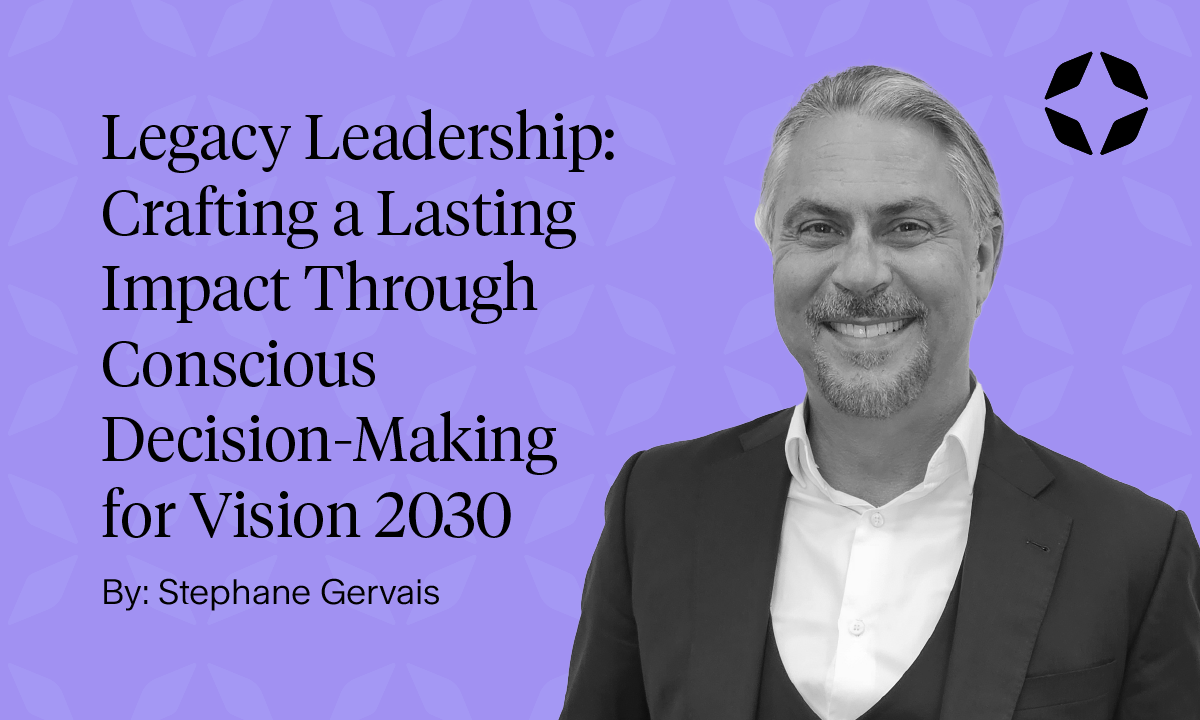There are three dimensions of time: past, present, and future. The future has yet to materialize; the past is forever gone and cannot be changed. We can learn from the past and let it inform the decisions we make in the present to create a better future. The only dimension that is "real" is the present. How leaders make decisions in the "now" creates the future, which becomes their legacy as soon as it comes to pass.
Leadership, however, isn't just about managing teams, achieving goals, or making tough decisions in the present. Authentic leadership extends beyond the immediate horizon and aims to create a lasting impact. Legacy leadership is a concept that encourages leaders to be mindful of the legacy they leave behind through the decisions they make.
In this article, we will explore the importance of legacy leadership and provide insights into how leaders can become more conscious of the legacy they craft by examining the incredible changes occurring in the Kingdom of Saudi Arabia under the stewardship of His Excellency Mohammed Bin Salman, the crown prince of Saudi Arabia. His ambitions are manifested in the ‘Vision 2030’ project, which includes unprecedented reforms for economic diversification and massive initiatives in the modernization of public life in the Kingdom, quickly transforming Saudi society.
I. Defining Legacy Leadership
Legacy leadership is a philosophy that transcends all traditional leadership models. It emphasizes the long-term consequences of one's actions and decisions in the present, looking beyond the immediate outcomes and focusing on the enduring impact on individuals, organizations, and society.
Legacy vs. Success
Legacy leadership differentiates between success and legacy. Short-term achievements, such as quarterly profits, project completion, or job promotions, often measure success. Legacy, conversely, is the enduring impression a leader leaves on the people they lead and the organizations they serve. It represents a significant paradigm shift for many leaders, calling on the leader to be more reflective and purposeful about the future they want to create by focusing on a farther horizon than the next quarter or the following year. Enduring success transcends time by leaving behind not only the leader's memory but also cultures, systems, structures, and processes that will ensure the next generation of leaders will have a solid foundation upon which to build.
The Timeless Leader
A legacy leader is not bound by time. Their influence continues to shape the future long after they've stepped down from their position. By recognizing this, leaders can shift their perspective from quick wins to sustained progress.
II. The Pillars of Legacy Leadership
Purpose-Driven Leadership
A strong sense of purpose guides legacy leaders. They understand that the impact of their decisions will be felt for generations to come. To become more conscious of the legacy they are creating, leaders must align their actions with a noble purpose.
Ethical Decision-Making
Ethics play a pivotal role in legacy leadership. Leaders must make ethical decisions that stand the test of time, even if they face short-term challenges or temptations to compromise their principles.
Mentorship and Development
A key aspect of legacy leadership is nurturing the potential of those they lead. By mentoring, coaching, and investing in the growth of others, leaders ensure that their influence continues to thrive through the success of their mentees. For, after all, the number one job of any leader is to create other leaders.
Environmental and Social Responsibility
Recognizing that we inhabit a shared world, legacy leaders understand the importance of environmental and social responsibility. They prioritize sustainability, inclusivity, and social justice in their decision-making.
III. Developing a Legacy Mindset
Self-Reflection
Leaders must engage in regular self-reflection to assess the impact of their actions and decisions.
They must use their self-awareness, or the ability to stand apart from themselves and analyze their thoughts and behaviours. They must also use their imagination and the ability to create new ways of doing and being. Their conscience, the ability to discern right from wrong. And their independent will, the ability to be proactive and behave their way into better results.
This reflective practice lets them make course corrections and maintain a forward-looking perspective.
Long-Term Strategy
Legacy leaders think strategically, considering the long-term implications of their decisions. They plan for succession and invest in initiatives that will have a lasting positive effect. Great strategies also assess the culture a leader wants to create. A strategy must include measurable behaviours (actions) that lead to desired results. Even though leaders create the future through words, an organization behaves itself into the future. Suppose we accept the definition of culture as the sum of the behaviours, language, and relationships people share. Therefore, it is paramount that a strategy also considers behavioural lead indicators or the behaviours that will shape the future.
Effective Communication
Communication is crucial in conveying one's legacy vision to one's team and stakeholders. Leaders should articulate their values, purpose, and expectations clearly to ensure everyone is aligned with the legacy they aim to create.
IV. Case Studies: Leaders Who Left a Profound Legacy
A. Nelson Mandela: The "Peaceful Pioneer". His legacy of reconciliation and justice in South Africa continues to inspire generations.
B. Mahatma Gandhi: The "Gentle Rebel: The father of the Indian nation, Gandhi's commitment to non-violence and civil disobedience has left an indelible mark on the world.
C. Steve Jobs: The "Innovisionary. His innovative spirit, incredible vision for the future, and commitment to design excellence at Apple transformed the tech industry and redefined customer experiences.
D. Mohammed Bin Salman: The “Prince of Change”
Since he was appointed crown prince in 2017, he has introduced a series of social and economic reforms. These include regulations restricting the powers of the religious police and improving women's rights, removing the ban on female drivers in 2018 and weakening the male guardianship system in 2019. The country has also invested massively in the tourism industry, as well as the infrastructure work related to it. Saudi Arabia has seen its first Cinemas, art shows, rock concerts, raves, theme parks, and even opera festivals popping up across the country.
Mohammed bin Salman is considered a role model to many leaders. He's the father of ambitious change in a country that resisted any form of secular influence for decades. He is at the forefront of ensuring the success of Vision 2030, which is considered a historical turning point for the Kingdom and a major breakthrough in securing a prosperous future.
Summary
In conclusion, in a world driven by short-term results and instant gratification, legacy leadership is a timeless philosophy that inspires leaders to make choices that transcend the moment. By embracing purpose, ethics, mentorship, and social responsibility, leaders can become more conscious of the legacy they leave behind. In so doing, they ensure that their influence continues to shape the world for the better long after their tenure has ended. Legacy leadership is not just a leadership style; it's a commitment to a brighter future, and that’s exactly what we see being created in the Kingdom of Saudi Arabia: a better future, and a better legacy.
About the author
Stephane Gervais, Senior Consultant
Stéphane is a business manager with many years of experience in the field of consulting and corporate training as well as the management of private companies.
Accustomed to action in the business trenches in the roles of EVP or GM, he develops as well as executes growth and profitability solutions and he has established himself as a catalyst for performance.
As a consultant, corporate trainer and business coach, he has worked with large corporations as well as government such as:
– Corporate: Fuji Films, Pfizer, Glaxo, Hospira (formally Abbott Labs), CAE, Great West Life, Standard Life, Diageo, Mouvement Desjardins, Macdougall Macdougall and Mactier, UTC Aerospace, Bombardier, ATI Global, Estée Lauder, Fresh Direct, Autodesk, Bunge, Suncor, Dow Chemical and many more.
– Government: The Canadian Space Agency, SSHRC, NSERC, Natural Resources Canada, Agriculture Canada, Canada Health Infoway, Sasktel, SDTC, Canadian Parole Board.
Stéphane is also a sought after keynote speaker. He is recognized as a catalyst for change and for inspiring audiences to adopt new paradigms that lead them down the path to extraordinary results. Stéphane regularly speaks on the challenges and solutions related to leadership, trust and productivity.
Click here to follow Stephane Gervais on LinkedIn





